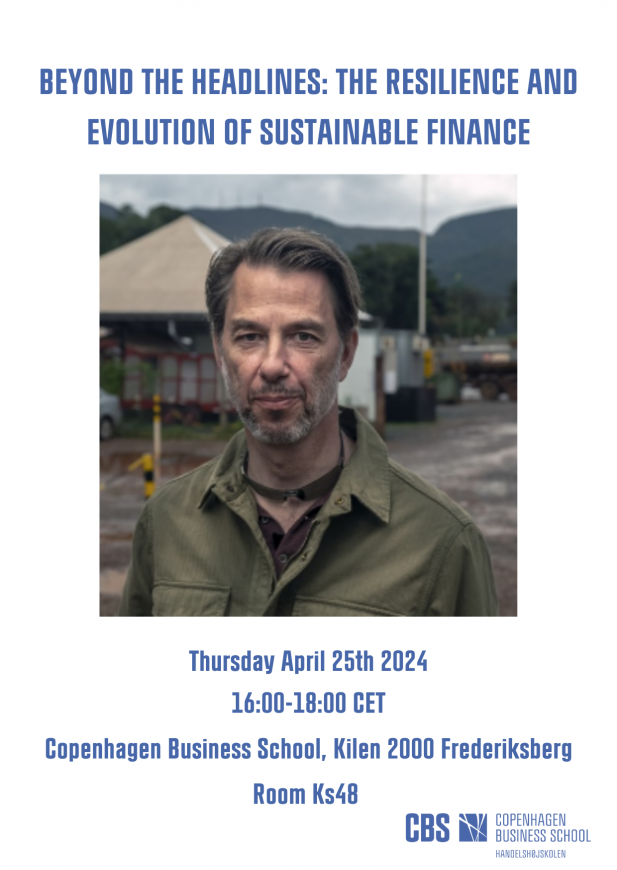Inaugural Lecture by Adjunct Professor Eric Pedersen - Beyond the Headlines: The Resilience and Evolution of Sustainable Finance
 |
|
|
After the lecture we are happy to welcome you to a reception in the Atrium in Kilen Sign up here |
|
AbstractSustainable Finance find itself at a crossroads. A fad like so many others, it has outlived itself and is collapsing under its own contradictions - gleefully helped on the way by a political backlash that, born in the United States, is now gaining momentum also in the UK, the Netherlands and elsewhere. That, at least, is the superficial narrative that can be found in parts of the media.
As is often the case, reality is more complex:
Some sustainable champion companies have indeed underperformed the borader market recently, due to higher interes rates and supply chain cost inflation, as well as for more idiosyncratic reasons. And Russia's invasion of Ukraine led to extreme outperformance of the industries typically not found in ESG portofolios: Defence and Oil & Gas. Notably in 2022, the energy sector, as represented by the MSCI ACWI Energy Index, outperformed the main MSCI ACWI index by a massive 52,4% in 2022, contradicting the all too common marketing hype that 'ESG investments always outperform'. Finally, the fact the investment funds under the loose headings of ESG and Sustainability saw outflows rather than inflows in 2023 generated many headlines.
At the same time, however- although much less widely publicised- assets in funds classified as "sustainable" by Morningstar swelled from just over $2.5 trillion at the close of 2022 to approaching $3 trillion by the end of 2023. Indeed, while the last quarter of 2023 did see the first net outflows from SFDR Article 9 funds as a whole, assets in Article 8 and 9 funds grew over the year, reaching a new record share of almost 60% of European fund assets. Finally, issuance of green and other sustainability- linked bonds grew healthy from 2022 to 2023, approaching the previous record set in 2021.
Market surveys also indicate continued - even increasing - interest: Over 80% of individual investors in both Europe and the US were found to be interested in sustainable investing in a large survey conducted in late 2023, and 56% in Japan. On this basis, it is safe to conclude that Sustainable Finance is not "dead" - a sentiment supported by investee companies globally continuing to add resources to their sustainability teams, including in the politically turbulent United States.
Still, proponents of Sustainable Finance should not rest on their laurels. Recent developments have shown that institutions active in the field must find a stable equilibrium between exaggerated claims (greenwashing, promises of perennial outperformance), and the risk of abdicating the responsibility to stand by their efforts and explain the very real benefits of Sustainable Finance ("greenhushing"), both to individual investors and at the all-important systemic level |
|
Short BiographyHaving completed thesis work on the Manmohan Singh economic reform programme in 1990's India in the 1990's, Eric Pedersen joined the United Nations as a junior economist in the Mali office of UNDP. A few years later, he joined the finance industry and has worked in various posiitons, including as Head of Business Strategy for Nordea's Asset Management and Life Insurance business, Branch manager in Singapore, and CEO of Nordea Invest. In 2019, Eric became a member of Nordea Asset Management's Responsible Investments Committee and in 2020, he took responsibility for the firm's Responsible Investment team, which has grown significantly in size and international recognition under his leadership. Eric has served on the Danish Committee on Corporate Governance, is the vice chair of DanSIF and a member of the ISSB Investors Advisory Group, as well as being a member of the Advisory Board of IMAP - the Boston University Impact Management and Allocation Program. |